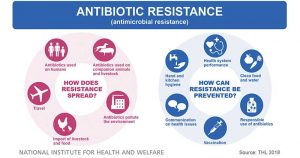Antimicrobial resistance (AMR):

Antimicrobial resistance (AMR) is a growing global problem to which the ongoing Covid-19 pandemic may further contribute.
- With resources deployed away from antimicrobial stewardship, evidence of substantial preemptive antibiotic use in Covid-19 patients and indirectly, with deteriorating economic conditions fuelling poverty potentially impacting on levels of resistance, AMR threat remains significant.
Antimicrobial Resistance (Meaning):
- Antimicrobial resistance is the resistance acquired by any microorganism (bacteria, viruses, fungi, parasite, etc.) against antimicrobial drugs (such as antibiotics, antifungals, antivirals, antimalarials, and anthelmintics) that are used to treat infections.
- As a result, standard treatments become ineffective, infections persist and may spread to others.
- Microorganisms that develop antimicrobial resistance are sometimes referred to as “superbugs”.
Basis of Antimicrobial Resistance:
- Some bacteria due to the presence of resistance genes are intrinsically resistant and therefore survive on being exposed to antibiotics.
- Bacteria can also acquire resistance. This can happen in two ways:
- By sharing and transferring resistance genes present in the rest of the population, or
- By genetic mutations that help the bacteria survive antibiotic exposure.
Reasons for Spread of Antimicrobial Resistance:
- The misuse of antimicrobials in medicine and inappropriate use in agriculture.
- Contamination around pharmaceutical manufacturing sites where untreated waste releases large amounts of active antimicrobials into the environment.
- India, with its combination of a large population, rising incomes that facilitate the purchase of antibiotics, high burden of infectious diseases and easy over-the-counter access to antibiotics, is an important locus for the generation of resistance genes.
- The multi-drug resistance determinant, New Delhi Metallo-beta-lactamase-1 (NDM-1), emerged from this region to spread globally.
- Africa, Europe, and other parts of Asia have also been affected by multi-drug resistant typhoid originating from South Asia.
- In India, over 56,000 newborn deaths each year due to sepsis are caused by organisms that are resistant to first-line antibiotics.
- India has undertaken many activities like Mission Indradhanush — to address low vaccination coverage — strengthened micro-planning and additional mechanisms to improve monitoring and accountability.
- The Ministry of Health & Family Welfare (MoHFW) identified AMR as one of the top 10 priorities for the ministry’s collaborative work with the World Health Organisation (WHO).
- India has also launched the National Action Plan on AMR resistance 2017-2021.




